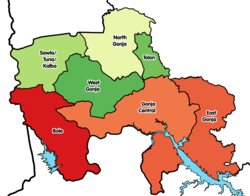Buipe | |
|---|---|
District Capital | |
Location of Buipe in Savannah Region | |
| Coordinates: 08°47′00″N01°32′00″W / 8.78333°N 1.53333°W | |
| Country | Ghana |
| Region | Savannah Region |
| District | Central Gonja District |
| Elevation | 436 ft (133 m) |
| Population (2013) | |
• Total | — |
| Time zone | GMT |
| • Summer (DST) | GMT |
Buipe, sometimes called New Buipe, is a town and the capital of Central Gonja District, in the Savannah Region of northern Ghana. [1]


















